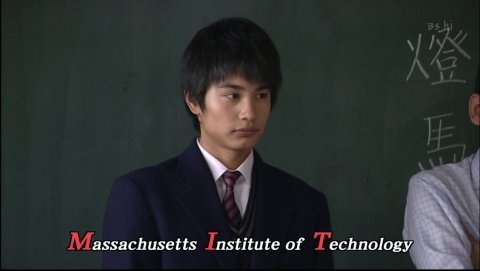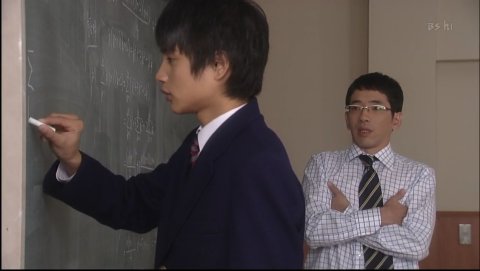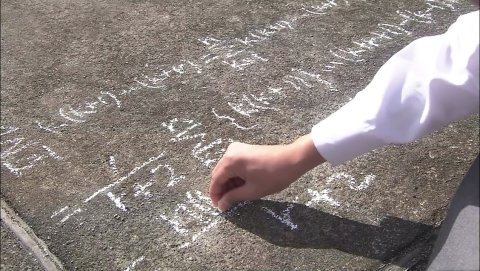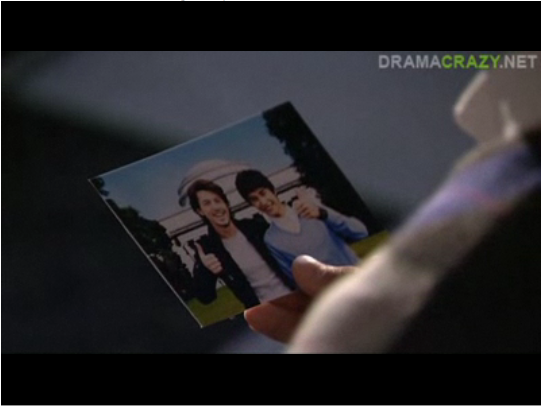Thank Goodness! by Chris S. '11
"There are bridges you cross / You didn't know you crossed / until you've crossed."
(the tagline is my favorite line from Wicked, hahaha – how “philosophical” it is LOL)
So hello from the other side of a terrible week of midterms! Although I’m technically only taking 4 classes this term, I had midterms in three of them (Spanish 4, Biology Lab, and Organic Chemistry – that’s 21F.704, 7.02, and 5.12 for all ye eager beavers) this week. Although the Spanish and Bio went fine, I’m pretty sure that the Orgo exam was a colossal disaster (despite me only sleeping around 4 hours in the last 40 hours because of studying for the test). Sigh. Any hints on how to do well in Orgo? It’s supposed to be the most basic of all my classes that I’m taking this semester (7.05 – biochemistry – technically requires 5.12 as a prereq but I’m doing them concurrently. Ironically, I’m getting a far better grade in 7.05 than 5.12) – but I’m seriously struggling in orgo. Argh!
< begins long rant on organic chemistry >
(I don’t know if you guys remember when you first learned Calculus. For me, when I first took Calc BC in sophomore year, Calc was just a huge nightmare, since there were so many tricks with integration and differentiation that you had to learn, and there were so many things that didn’t make sense to my young and undisciplined mind. I don’t know if it was the fact that the idea of calculus seemed so novel to me or whether our calc teacher purposely selected the most difficult problems that he could find –
(seriously, he was so mean – through his preparation, I almost did the actual AP test “blindfolded” (ok not literal), finished in half the time allotted, and passed it with flying colors)
– but I remember staring at pages of worked examples but just seeing a huge blob of numbers and variables melting into each other. Larson, Anton, & “1000 Worked Problems in Calculus” quickly became my best friends through long sleepless nights.
Now, it’s funny, because I almost feel the same way with Orgo. Just like Calculus, I feel it’s almost like learning a new language in the sense that you have to really re-examine the way that you “think” about chemistry and no longer depend on the memorization or the erroneous reasoning that may have carried you through in the past. I would spend hours studying McMurry – thinking I’ve understood all the reasoning and the mechanisms – but then turn to a pset or some solved examples and feeling completely lost again. Meh.
In retrospect, I picked up many calc problems that I struggled with in the past when I was sorting my high school papers out last year, and now, they seem like child’s play. Perhaps Larson had done his magic in my head, but I feel like some parts of calculus had ingrained themselves so deeply in my mind that they could never be removed. I can only hope it’s the same for orgo?)
< finishes long rant on organic chemistry >
Spring Break is coming up, and tonight I’ll be leaving with five of my peers to The Hague, Netherlands, where we’ll be representing MIT (well, and the nation of Belize) at WorldMUN. Should be quite exciting and a welcome break away from campus (although, on the bright side – Boston is getting a lot warmer recently! hehe).
Well, this post is more of a celebratory note after a week of hideous preparation for exams (after I press the “save” button, I’m going to go snooze until 1 PM =p). So it’s pretty devoid of meaningful content, hahaha. Although I do want to share with you a JDrama that I just finished watching that has connections with MIT!
The drama is called QED, Shoumei Shuuryou in Japanese, and it actually only just finished airing in Japan like 2 weeks ago, so it’s really recent! (actually, it started airing when I was spending IAP in Japan).

Well, you guys know what QED is in English, and Shoumei Shuuryou is basically just the equivalent of that in Japanese.
The drama profiles this prodigy guy (Touma So) who graduated from – you’ve guessed it – MIT when he was only 15. (as the valedictorian of Course 18 to boot – what makes me more curious is that MIT doesn’t append honors to degrees, so can one know that he graduated first? =p). For some reason (to be discussed in the drama), he decided to leave off continuing at MIT for grad school and enroll himself in a regular Japanese high school. At the school, he is befriended by Kana, the energetic and oft-flamboyant female protagonist, whose brash actions lead the duo into one adventure after another.
The drama is laid out like most detective dramas, with one episode consisting of one mystery, and usually Touma solving the crime very suavely 10 minutes before the end. His signature is presenting his argument and analysis of the mystery with the letters Q. E. D. – which contributes to the title of the drama.
So the whole drama has very little to do with MIT as a whole after Touma was introduced as a MIT grad in Episode 1, but I find it kind of amusing how that drama inadvertently also reveals many stereotypes and conceptions towards MIT (or prestigious universities as a whole in the US) in the Japanese society. For example, “MIT” was often uttered with an air of awe in the drama, and we often see Touma writing mathematical proofs on the blackboard with speed and elegance (actually – I feel this math stereotype towards MIT is very emphasized in Asia. my host family in Japan was pretty surprised in the beginning when I told them that I was studying biology at MIT, since they thought that only math, physics, and computer science existed at MIT). I also thought it was pretty interesting how the directors chose MIT (or rather, the original author of the manga, since this drama is adapted from a manga series) to be Touma’s alma mater, when he could have as easily chosen Harvard or Princeton, for example.
This just goes to show that the letters M. I. T. are forever connected with scientific excellence no matter where you are in the world. ;)
Anyways, there’s a few more pics that attest Touma’s suaveness bestowed upon him by MIT.


MIT students often point out their teachers’ mistakes, y’know? =p

So these photos are stolen from a MIT grad student’s blog (thanks and sorry for the hotlinkage! =p) and she goes into an admirably deep analysis of the mathematical proof presented in the first episode, should you be interested in pursuing the subject further. =p

So this is later on in the drama – recognize that building in the background? (and the admittedly poor Photoshop skills? =p)
The drama itself is comprised of ten 45-minute episodes, and is fairly enjoyable throughout (I must warn you, however, that the drama veers into severe fantasy plots towards the end of the series, and that was kind of irritating given the more “scientific” feel of Episodes 1 and 2).
(ps. It’s also kind of interesting after you see how often Touma consumes yakisoba pan in the series. Along with his dramatic Q.E.D flourishes, this is another thing to look for =p.
pps. I also really love yakisoba pan, and that’s why I brought it up, hahaha. Try some if you go to Japan! They’re usually really, really cheap – like around 100 or 200 yen.)
Have a wonderful wonderful spring break!
Cool. I’m not alone with orgo….
Chris,
I’m a junior in highschool and at the end of this year, I’ll have completed every math class offered at my high school. What did you do for a math class when you were done with Calculus BC? I’m trying to figure out what I should do next year and help would be very much appreciated.
hey i read that manga. i like kindaichi better, though.
Brian, One Piece is the greatest manga ever.
Seriously. That’s not an opinion, it’s the manga chosen by the world, and I promise that it’s the most bought manga in Japan for a reason!
well chris, organic chem isn’t as hard as u feel. i am a high school senior from India and I have been studying org for the past three years and i should say I studied a good deal about alkanes, alkenes, alkynes, alcohols, carboxylic acids, aldehydes and ketones, halides, arenes , aromatic compounds, amines, nitro compounds and so on. All the mechanisms are very easy once u understand the basic types of mechanisms like SN1, SN2, E1, E2, SNi, SNi’, addition, substitution, both nucleophylic and electrophylic. just try to get a good grasp over these basic mechanisms and the effects like inductive effect, resonance effect, field effect etc and u’ll be playing with org.
I didn’t get accepted at MIT and i know I am not supposed to be saying this to an MIT student ! but I just wanted to help u in a little way possible to me. thats it. sorry if I did anything wrong ! bye
lol. if anybody wants to watch QED free online and dubbed in English…go to mysoju.com and search for it..it’s there!!! xD
@ Katie –
You can begin taking multivariate or differential equations. Inquire with your local community college (we didn’t have this in Taiwan!) whether you can take some math courses there. Otherwise, online programs like Stanford EPGY offer multivariable as well.
After I was done with BC, I took Multivariate Calculus with Stanford EPGY (I think the course number is M52 or something like that). I thought the service and the teaching was alright – you watch videotaped lectures and do assignments out of the textbook, but it’s nothing super special to write home about. I think having a live teacher might be better though – but it’s up to you!
@ Narce –
Hahaha, one piece…
@ Sahasra –
I have no doubt that some of the applicants are more advanced than current MIT students! Thanks for your insight – I’m trying to do my best but I feel like the main constraining factor with me with orgo is that I simply just don’t have enough time to learn the material, and that’s why it’s difficult at this point. Ideally, if I’m not taking as many classes or doing so many activities, I would probably be getting a better grade – at least, that’s what I think, haha. Orgo is a very time-consuming subject.
One Piece is amazing! Do you actually read it, Chris?
Wow, watching the first episode, and Mizuhara-otou-san is amazing XD
First!
But I wasn’t accepted :(
Reminds me of detective school Q…that was one cool anime…
^yup tantei gakuen q!! & the super smart ryuu!
@ Sahasra – It’s possible that you know a lot more organic chemistry than Chris, but it’s more probable that you don’t understand the depth at which MIT courses are taught. Classes are far beyond memorizing a long list of terms and mechanisms.
I know this has no relevance here, but Naruto is the best manga ever!
Again with the One Piece, Narce? XD
And, Yay! A new blog entry!
Wasn’t QED also a play that some of MIT’s theater group was involved in, about the life of Feynman?
the 5.12 exam was most probably the worst test I have ever taken in my life.
for realz
:(
@piper’12
I never advised anyone to memorize things. By understanding, I mean really understanding the subject and the way subject opens itslf. And by my humble experience, I found out that the key to opening the doors of this great subject is finely understanding(please note understanding not memorizing) a few basic points.
Well, Piper, you might be an MIT student, but it doesn’t mean no one other than MIT students understand the ways in which MIT works. Definitely, you’ll know better, but few of us here also know a bit about MIT and its classes. It may be my misfortune or fortune, I didn’t get into MIT, but my brother was an MIT alumnus. I know somethings Piper.
I didn’t want to write that above comment about orgo, but I saw Chris writing in the first paragraph asking few suggestions.
I am glad that u enjoy MIT. But please understand the correct tone of the writer. I never said I know anything more than Chris or any of your great MIT friends.
It was my mistake writing there. Sorry. I’ll never do that again.
@ narce,
I completely disagree..
visit http://www.onemanga.com and look up the most popular manga..
haha calc BC in sophomore year. I’m taking it now in senior year and it is very hard to learn all the things the AP exam expects you to recognize. Time limits also suck. I wish I was cool like you guys and destroyed all the math my school had to offer in 2 years. I’m way behind…
LOL @ 5.12 being a prereq for 7.05.
7.05 doesn’t take anything from 5.12 except arrow-pushing. I’d advise anyone who’s anyone who has to take 7.05 and 5.12 to take them at the same time. :p
@Brian
That’s American popular manga. And while onemanga isn’t necessarily the best place for that in the first place (Nana, the most popular shoujo in Japan, doesn’t get attention because onemanga is primarily for Shonen), One Piece has gained American popularity (finally!) over the last 2 years SIGNIFICANTLY compared to what it used to be at.
Even though it’s been the most popular in Japan, for, I dunno, 3+ years?
And the popularity of One Piece in Japan outweighs the popularity of Naruto in America by so much it’s ridiculous.
Just… FYI.
I loved QED! At first I only watched it because one of my favourite Japanese idols (Takahashi Ai) was co-starring in it, but the cuteness of the male star plus the mention of MIT made me watch it to the end. Just a fun little series that made my evenings much happier, hehe.
Great post Chris! Lots of things I enjoyed in this one from: mysteries, to Japan, to Wicked (Lemons and melons and pears! Oh MY!), to even organic chem! And not gonna lie, Q.E.D. sounds a lot like Case Closed.
Hey, can you give me tips on a possible chance in getting into MIT. I like computers; my dads a wiz. I now like making games too. Trying to be TONY STARK, but not the prodigy part.
I’m going to post this on every blog entry of yours: MITMUNC!!!!
but yes; MIT == ultimate smart-temple in Asia
I didn’t expect any of the MIT Admissions blogs to find my blog, but I’m glad you enjoyed the analysis.
I agree that the show went downhill after the first couple episodes (part of the reason I’m behind on writing analyses for the mathy stuff in some of the later episodes), which is unfortunate. :( It’s also unfortunate that math seems to be presented throughout the series as pure equation-chugging, which is totally not what math is about.
But seeing MIT in the show was definitely enjoyable.